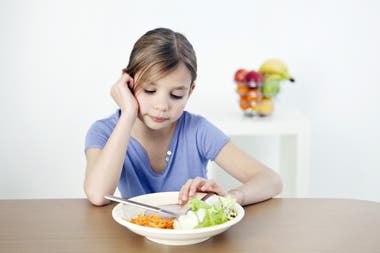
It is an alarming reality: more and more children and adolescents begin to develop eating disorders at an early age. There are no official statistics, but specialists agree that the increase in cases is worrying: they already attend to girls and boys from the age of 8. “I received 10 girls in my office who met all the criteria for anorexia. Although the adolescent population continues to be the prevalent one, I am alarmed by the increase in this pathology in girls,” says Mariela Di Lorenzo, pediatrician specializing in child nutrition.
For boys and girls, eating disorders are especially risky because they can escalate quickly stopping their growth and development. Therefore, it is important that parents have tools that allow them to prevent them from the first years. Next, we share different tips so you can get there earlier.
The keys to prevention
- Teach them not to worry all the time about their weight, how much they eat, or how thin they look. “Tell them that the important thing is to feel healthy and happy, that these sad things are not worth it because of how they look “, suggests Juana Pouálisis, a psychiatrist specializing in the subject and author of the book The new eating disorders.And he adds: “To convey to them that healthy and happy people do not fit one size fits all, they come in all kinds of packaging.”
- Pay attention to the comments we make of our image. Appreciating and respecting yourself is contributing to a healthy self-esteem. “If we, in front of the mirror, look at ourselves and say: ‘I’m so fat,’ the boy is going to think that this is very important,” explains Pouálisis. In addition, he maintains that we must avoid weighing ourselves in the balance in front of them.
- Teach them not to make fun of people because they are too fat, skinny, tall, short or any other physical characteristic.
- Talk to them about the dangers of following a restrictive diet.
- Encourage eating habits whereeating is a response to hunger. It should not be used as a resource to lower anxiety, overcome moments of stress or calm anxiety.
- Reflect on the expectations that one has in relation to the image of the sons and daughters. “Do not fall into the trap of projecting ideals of thinness that are out of date with their genetics and physical build. Many times the first to show dissatisfaction with the body image of a child is the father or mother herself”, reflects Pouálisis.
- Help boys and girls build their self-esteem. “The best gift a parent can give a child is appreciation and love. When adults show children that they value and love them unconditionally, they can face any challenge and overcome risks with less fear and without trauma. Self-esteem is essential to immunize a child or young person against eating disorders, “says Pouálisis.
The moment of the family table
- Sharing meals as a family. “Studies show that with at least one family meal a day, the probability of developing an eating disorder is reduced, because you model what children eat and, in addition, the focus stops being on food and shifts to sharing emotions and chat “, details Pouálisis.
- Generate moments of tranquility and a relaxed atmosphere while eating. This keeps kids from feeling nervous or stressed. Associating food with a moment of tension can negatively impact food health, experts say. “Every opportunity should be taken to make the table a moment of intimacy, where food is shared and bonds are renewed. They are so important. these good eating habits, “reflects Pouálisis.
- Than There is no television or cell phones that interfere with communication when sitting at the table. The screens during meals make us miss the opportunity to meet through dialogue and strengthen ties.
- Eat the same. It is not convenient for them to see us eat a salad, while they eat a plate of pasta. It is best to share the same food.
Physical exercise
- As adults, do physical activity in a pleasant way. Avoid doing it compulsively, obsessing over losing weight since the boys will receive that example.
- That the physical activities that the boys carry out are social. “It is very common for many young people to go to the gym at the age of 15, that is not good. It is better that they do recreational sports as a team, an activity in connection with others and in the open air. That they understand that the importance of sports has to do with improving the quality of life and releasing endorphins, “says Paula Hernández, a psychologist at La Casita.
- Go out with the boys to ride a bike or walk. Not because it’s functional to look good, but because it’s fun to do as a family.
The keys to prevention
02:49
An ally: values
- Teach the boys to build a critical judgment on aesthetic values, accepting differences. Show them that we are all different and, the physical structures, too. “Adults sometimes laugh at fat jokes, that way they invite children to do the same. Bullying by weight is the first issue in bullying situations in schools. You have to show children that people healthy and happy does not fit one size, how boring it would be if we were all the same! “says Pouálisis.
- Strengthen their self-esteem and confidence in themselves. Do not comment on their bodies or issues of physical beauty, focus on their values, attitudes, abilities, good gestures or virtues. “It is also not good to compare their bodies with those of their friends or refer to other people as fat or skinny,” says Paula Hernández.
The risks of social media
- Be attentive to what we adults show on social networks. If we choose to post photos of happy moments or share only images where the attention is focused on our appearance. It is also not good that they see us retouch a photo so that the flat belly or the longer legs appear, it is always better to show ourselves as we are.
- Pay attention to what boys and girls consume on social media. “There are many influencers who talk about their own body and their way of eating. It is important to teach children that many of them are not specialists and, in general, show only one aspect of their life. Also, if the greatest part of the day our son or daughter is following food pages, their brain is going to be obsessed with that. So, if there is a person who is influence – hence the term influencer – I have to know who they are, just like when They go to a friend’s house. It is very important to get involved, “says the La Casita specialist.
The two most common mistakes made by parents
1. Put them on a diet
Specialists warn that It is not good to put our sons or daughters on a diet, or make comments like: “You have to lose weight.” “If your boy has a sweet tooth or likes to eat a lot, you have to help him in different ways, for example: to eat more slowly, to register if he really is hungry or something else is wrong and to do physical activity together such as walking bike “, explains Pouisis and assures that it is not advisable to impose strict very healthy habits. For example, if we are done eating, we can get up from the table or change activities. Also, be ordered with the snacks so that the boys and girls are not snacking all day.
A healthy diet includes a variety of foods. They should not be deprived of consuming good things or prohibited from foods they enjoy. It is also not good to refer to foods as “good” and “bad”. Boys should eat a variety of foods in moderation. Fruits, vegetables and, in a moderate way, also rich things such as chocolates, alfajores or candies should be included, emphasizes Pouisis.
2. Using food as a reward or punishment
Another of the most frequent mistakes is to use food as a reward or punishment for some behaviors. “It is good to treat a child with a cake but it is not good to put the cake in the place of the medal that it would obtain if it made enough merits”, indicates Pouisis since in binge eating disorders it is common to find that the food with which it is triggers compulsive eating is related to some prohibition or to what was reserved only when there was reason to deserve it. “The forbidden always invites transgression“, emphasizes the psychiatrist.
Where to turn for help
- La Casita: is a care and prevention center for adolescents and young people and their families. To address the problem that may arise, it works emphasizing the resources of the person and their family system, relying mainly on the peer group. Tel .: 011 4787-5432.
- Durand Hospital Tel .: 011 4982-5555 / 5655
- Hospital Piñero Tel .: 011 4631-8100 / 0526
- Borda Hospital Tel .: 011 4305-6666 / 6485
- Pirovano Hospital Tel .: 011 4546-4300
- Argerich Hospital Tel .: 011 4121-0700
- Garrahan Hospital Tel .: 011 4122-6000
- Gutiérrez Hospital Tel .: 011 4962-9247
.
Publicado en el diario La Nación




